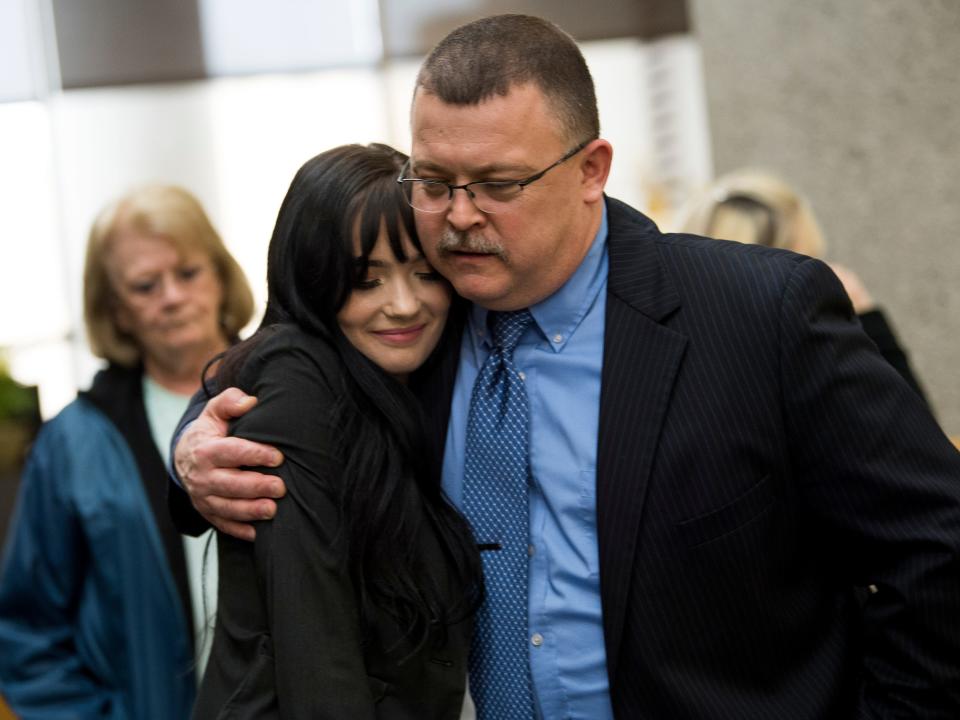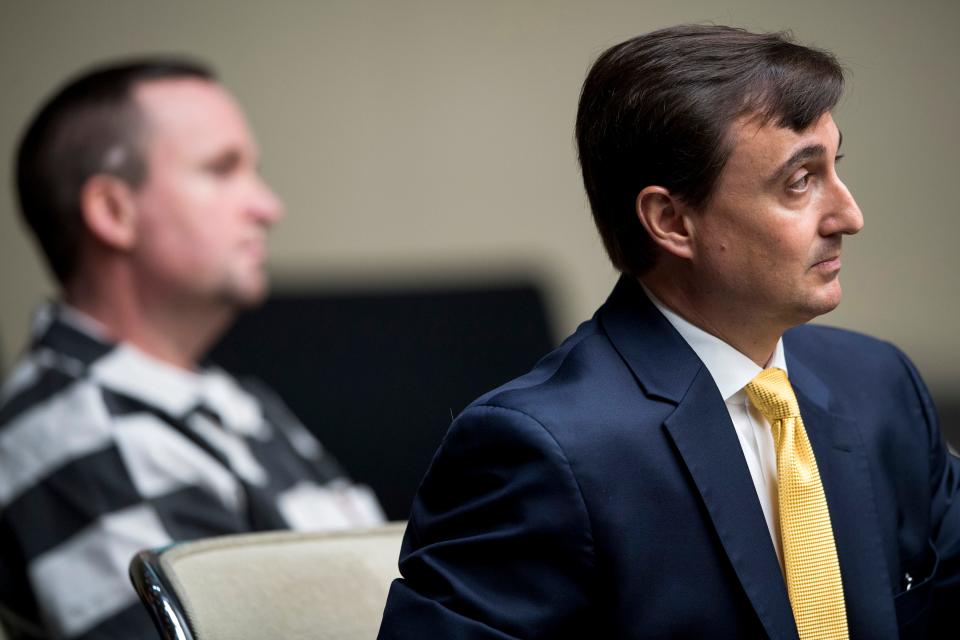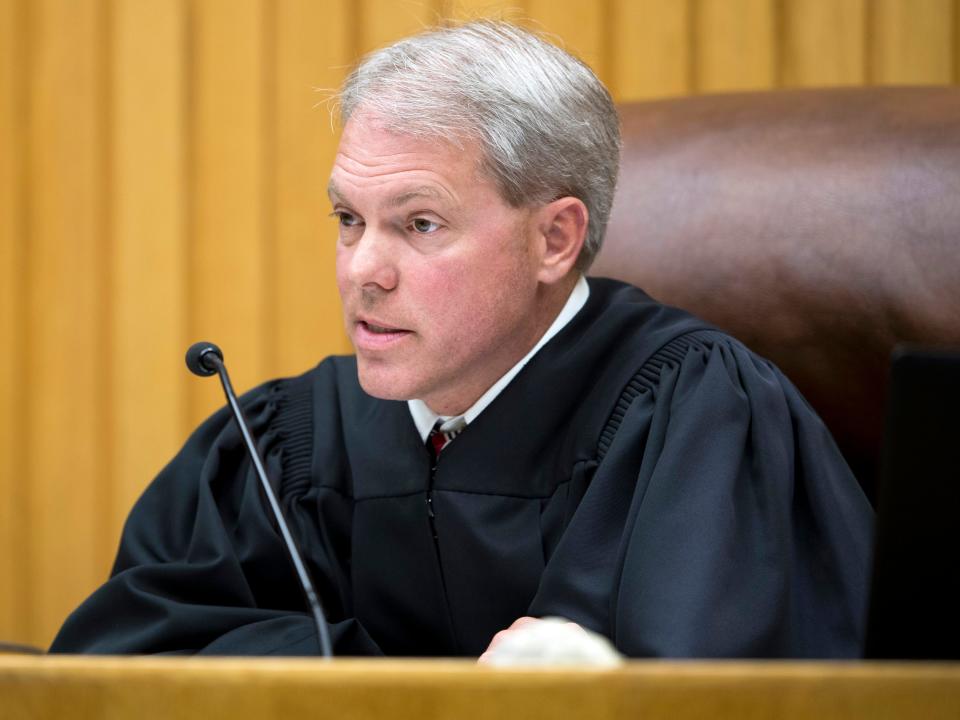Former Lenoir City pastor argues why he deserves a new trial after rape and incest conviction
The case drew an enormous amount of media attention back in 2019. The salacious details guaranteed that. A pastor of a small church, accused of repeatedly raping his adopted daughter.
David Richards, a onetime foster care worker at Smoky Mountain Children's Home, was convicted Feb. 12, 2019, on charges including rape, incest and sexual battery by an authority figure. The trial in Knox County Criminal Court pitted his adopted daughter Amber, then 21, against her biological sister and David Richards.
Knox News typically does not identify victims in sexual abuse cases, but Amber Richards agreed to be named after the trial.
David Richards was eventually convicted of nine felony counts including rape, incest and sexual battery by an authority figure for the repeated abuse over a period of nearly two years and was sentenced by Judge Steven Sword to 12 years in prison.
Now Richards is back in court with an attorney who specializes in appealing wrongful convictions, asking for a new trial because of evidence discovered after the trial and claims his previous attorney was incompetent.

Issues with credibility arose
The physical evidence against David Richards consisted mainly of bodily fluid samples found on his adopted daughter's bedframe, which former Tennessee Bureau of Investigation scientist Amory Cannon testified was semen, and the fact that both his and his adopted daughter's cellphones had been reset to factory conditions, wiping away potentially incriminating text messages she said he sent her.
David Richards, through his attorney, attacked both pieces of evidence.
The judge previously allowed defense experts to examine the cellphones and test the bodily fluid with their experts. Sword also reviewed the TBI records explaining why Cannon came under investigation. After that private review, Sword said the records contain information that helps the defense.
The DNA evidence was tested by the TBI's Cannon, who left her job at the state's top law enforcement agency after the trial.
Jurors never heard that she abruptly resigned in 2016 during an internal investigation, apparently due to falsified time cards.
Richards' attorney at the time, Gregg Harrison, said in an interview he never thought to ask why. He thought his client had a strong case and the fact that the former pastor had undergone a vasectomy years ago would negate the scientist's testimony.
What evidence was presented on appeal?
David Richards' new attorney, Stephen Ross Johnson, has substantial experience appealing wrongful convictions. Johnson helped found the Tennessee Innocence Project, was involved in passing the Tennessee Post-Conviction DNA Analysis Act of 2001, and helped establish the procedures in Tennessee for bringing newly discovered evidence claims.
His appeal argument for David Richards was three-pronged: New evidence that wasn't heard at trial, undisclosed evidence that could help his client and the typical claim that his previous attorney was incompetent.
Through multiple days of testimony starting back in May, Johnson sought to cast enough doubt on the DNA and cell phone evidence to prompt a new trial. Johnson also presented new evidence that, he argued, undermined Amber Richards' credibility, including what he said was a prior unfounded claim of sexual abuse.
The defense's DNA expert testified the DNA found on Amber Richards' bed frame likely was canine, an assertion disputed by the prosecution. She also cast doubt on Cannon's testimony at trial, saying it was misleading to tell the jury the DNA tested positive for seminal fluid. Cannon's testimony made it sound definitive when it was not, she said.
Johnson also provided more context into Cannon's resignation from TBI, which stemmed from incorrect reporting on payroll timesheets and case notes for work done when she wasn’t in the building. None of her cases were re-tested, Johnson said, even though their integrity should have been in question.

Johnson sought to discredit the cell phone evidence, with an expert testifying one email address was tied to both phones and that neither phone was in Richards' possession at when they were wiped clean.
The performance at trial of David Richards' former attorney, Gregg Harrison, also was the subject of appeal testimony. Defense experts said it fell below the standard of reasonable care, that Harrison should have tested the DNA and should have hired an expert to check the cell phones.
Judge calls psychiatric testimony 'shocking' and not credible
At the end of the hearings, the judge last week took the unusual step of castigating the testimony of a psychiatrist and affirming his belief in Amber Richards.
Sword pointed out he had found both Amber and David Richards to be credible during the 2019 trial, but told Amber, "The jury believed you and I believed you, and I still do."
The judge said he found the testimony offered at appeal by Dr. Sidney Alexander to be "shocking," and added, "I found him to not be credible at all as to who you are as a person. I think you have a chance to have a good and healthy life. ... I didn’t find him credible at all, as to who you are as a human being."
Alexander, a forensic psychiatric examiner, said Amber was suffering from borderline personality disorder probably stemming from a "chaotic, abusive, abandonment-filled life."
After Johnson's closing argument, the judge said he would take his time sifting through the lengthy testimony and would rule within two months, adding he expects his decision to be appealed no matter how he rules.
How did we get here?
David Richards, a former minister at My Father's House Church of God in Lenoir City, and his then-wife took in Amber and her three biological siblings as foster children in 2008, then adopted Amber and her older sister.
Amber Richards was 16 on Dec. 3, 2013, when she told a guidance counselor she had woken up that morning to find David Richards pulling her hand inside his pants.

The next day, the teen sat for a forensic interview and said the abuse spanned from being inappropriately touched in 2011 to being repeatedly raped, starting in the summer of 2013, while she pretended to be asleep.
Amber told authorities where they might find semen stains in her bedroom – a bed comforter, the bed frame and a purple rug.
At trial, David Richards described himself as a divorced, single dad simply trying to rein in a defiant teen. Amber Richards painted him as a vindictive manipulator who punished her when she spurned his offer to take their relationship "to the next level," after she had endured nearly two years of sexual abuse in his home.
Little physical evidence existed and in the end it came down to the jury believing Amber's testimony over that of her adoptive father.
This article originally appeared on Knoxville News Sentinel: Former Lenoir City pastor argues he deserves a new trial

